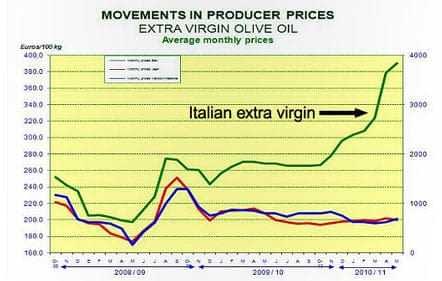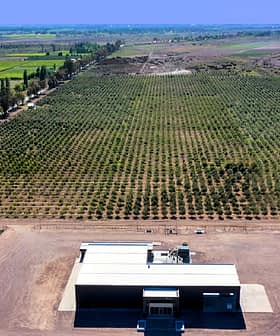Imports of olive oil into the European Union were up 27 percent in the five months to February, according to the International Olive Council’s May Market Newsletter, released today.
However, since November – well before the March 11 tsunami – imports into Japan have been lower every month than the year before, reaching a cumulative fall of 10 percent.
The newsletter highlights that combined imports by Australia, Brazil, Canada, Japan, the USA and the EU in the first five months of 2010/11 were up 120,386 tons, or 22 percent more than the same period the season before.
Individual import increases for the six months to March compared with the same period a year ago were for Australia 2 percent, Brazil 19 percent, Canada 17 percent, and the USA – which in March alone imported 31,727 tons – was up 17 percent.
Meanwhile, producer prices for extra virgin olive oil have soared 45 percent in Italy, to €3.90/kg ($5.60/kg), compared with last year, but are down 4 percent in Spain (€1.98/kg) and 5 percent in Greece (€2.04/kg).
“Prices have recorded a very steep increase in Italy in recent weeks, contrasting with the drop in Spain, although they now appear to be leveling off at around €3.90/kg. This confirms the growing distance between the prices paid to producers in Italy and those paid in Spain and Greece,” the IOC said in the newsletter.
As for refined olive oil, prices have slipped in both Spain (2 percent) and Italy (4 percent). No data was available for Greece.
“The very mild price recovery that began in August 2010 continued through to mid-December, since when the trend seems to have reversed. The bulk of this recovery appears to have been lost although there have continued to be minor price fluctuations since the summer. Unlike the price of extra virgin olive oil, the price commanded by refined olive oil differs very little (0.14%) between Italy and Spain,” the IOC said.
The newsletter focused on Turkey, which will host the IOC’s 17th extraordinary session in Istanbul, from June 27 to July 1. Turkey rejoined the IOC just over a year ago and has stated its ambition to move from being the world’s sixth to its second biggest producer, after Spain.
For 2010/11 Turkey expects an output of 160,000 tons but hopes to nearly double this – to 300,000 tons – in the next five years. In 2009/10, Turkey exported 29,500 tons of olive oil, mainly to the EU27, USA, Saudi Arabia and Japan, in descending order of volume.
Olive oil accounts for just nine percent of Turkey’s total vegetable oil consumption, a low level attributed to poor consumer awareness of its health benefits. Per capita olive oil consumption was 1.4kg in 2010 but is forecast to rise to 5kg by 2015.









